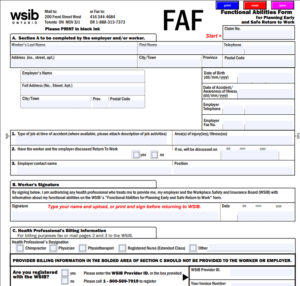When it comes to return-to-work planning for psychiatric disability claims, there are several factors to consider to ensure a successful transition back to work.
- Obtaining Medical Information
- Understanding the Job Requirements
- Involving the Employee in Planning Process
- Developing a Gradual Return-to-Work Plan
- Monitoring Progress and Adjusting as Needed
- Challenges to Consider
- Legal Considerations & Collaborative Approach
Let’s examine each factor individually:
Obtaining Medical Information
Prior to initiating a return to work plan, it is important to obtain relevant medical information as it is necessary to have a clear understanding of the claimant’s medical condition and treatment plan.
This includes reviewing medical records, consulting with the treating physician or psychiatrist, and understanding the medications and therapies the claimant is receiving.
This information can help you identify any barriers to the claimant’s return to work, such as medication side effects, therapy appointments, or the need for reasonable accommodations.
Understanding the Job Requirements
It is also important to fully understand and elucidate the nature of the job in order to develop an effective return-to-work plan, and to fully articulate the essential job duties and responsibilities of the employee.
This includes assessing the physical and mental demands of the job, as well as any environmental factors that may affect the claimant’s ability to work. By understanding the job requirements, you can identify potential accommodations or modifications to help the employee perform their job duties.
Occupational Therapists and ergonomists can be of instrumental assistance in this regard.
Involving the Employee in Planning Process
Collaboration with the employee and involving them in the return-to-work planning process is also imperative.
This includes discussing their goals, concerns, and limitations. By working together, you can develop a plan that is tailored to the employee’s medical needs, restrictions, and limitations.
This collaborative approach can also help build trust and engagement, which can lead to a more successful return to work.
Developing a Gradual Return-to-Work Plan
It is also advisable to develop a phased or gradual return-to-work plan.
A phased return-to-work plan is a gradual and flexible approach to returning to work. This may involve a reduced work schedule, modified job duties, or other accommodations to help the employee ease back into their job.
For example, a phased return-to-work plan for someone with a psychiatric disability might include starting with half days or reduced hours, or having a flexible work schedule to allow for therapy appointments and cognitive/emotional recharging.
Monitoring Progress and Adjusting as Needed
During the return to work plan, it is paramount for the employee and/or case manager to monitor the employee’s progress and adjust the plan as needed.
This may include modifications to the job duties, accommodations, or other aspects of the plan to ensure a successful return to work. For example, if the employee is struggling with a particular task or accommodation, you may need to adjust the plan to find a better solution.
Regular check-ins can help identify any issues and provide an opportunity to make necessary adjustments.
Challenges to Consider
There are also several challenges that can arise in return-to-work planning for psychiatric disability claims that are important to be aware of as well.
Taking these issues into consideration can assist the employee in their adjustment and their transition back into the workforce.
Potential for Stigma and Discrimination
One of the biggest challenges for individuals with psychiatric disabilities returning to work is the potential for stigma and discrimination in the workplace.
This can include negative attitudes from colleagues or supervisors, reluctance to disclose the emergence and/or worsening of a mental health condition for fear of being judged or stigmatized. These attitudes can make it more difficult for the employee to return to work and can potentially create a hostile work environment if not ameliorated. Some employers and supervisors may have limited understanding of mental health conditions and how they impact an employee’s ability to work.
Resulting in a lack of awareness of potential accommodations or modifications that could help the employee return to work successfully.
Strained Resources
Strained regional resources and/or limited access to mental health treatment can also be a challenge, particularly for individuals without extended health benefits or with limited financial resources.
Making it more difficult for individuals with psychiatric disabilities to receive the necessary treatment and support to return to work.
Complexities of Psychiatric Disabilities
Psychiatric disabilities can also be complex and symptoms can fluctuate over time.
This can make it challenging for the employer to develop a return-to-work plan that accommodates the employee’s changing needs and limitations.
Frustrations across the board can arise.
Legal Considerations & Collaborative Approach
Return-to-work planning for psychiatric disability claims must also comply with legal and ethical considerations.
Employers should be aware of their legal obligations and ensure that they are providing reasonable accommodations and not discriminating against employees with psychiatric disabilities.
Return-to-work planning for psychiatric disability claims requires a thoughtful approach that takes into account the unique challenges and needs of the employee.
By working together with employees and addressing the challenges that arise, employers can help facilitate a successful return to work for individuals with psychiatric disabilities.
Successful return-to-work planning for psychiatric disability claims requires a collaborative approach that takes into account the employee’s medical condition, job requirements, and individual, medical and psycho-vocational needs.






